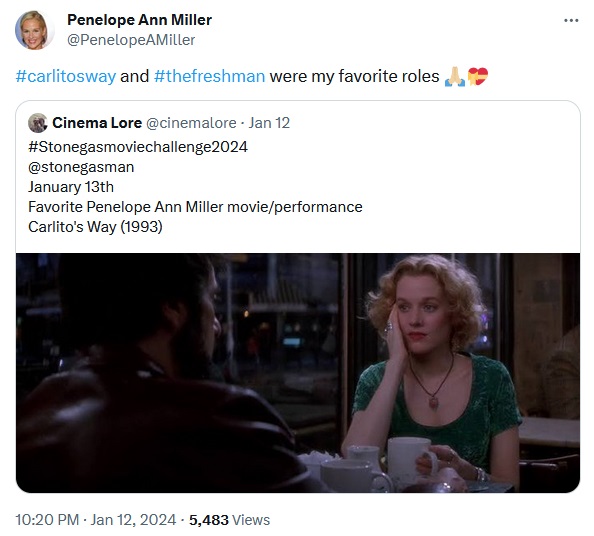
 Hello and welcome to the unofficial Brian De Palma website. Here is the latest news: |
|---|
E-mail
Geoffsongs@aol.com
-------------
Recent Headlines
a la Mod:
Listen to
Donaggio's full score
for Domino online
De Palma/Lehman
rapport at work
in Snakes
De Palma/Lehman
next novel is Terry
De Palma developing
Catch And Kill,
"a horror movie
based on real things
that have happened
in the news"
Supercut video
of De Palma's films
edited by Carl Rodrigue
Washington Post
review of Keesey book
-------------
Exclusive Passion
Interviews:
Brian De Palma
Karoline Herfurth
Leila Rozario
------------
------------
| « | September 2024 | » | ||||
| S | M | T | W | T | F | S |
| 1 | 2 | 3 | 4 | 5 | 6 | 7 |
| 8 | 9 | 10 | 11 | 12 | 13 | 14 |
| 15 | 16 | 17 | 18 | 19 | 20 | 21 |
| 22 | 23 | 24 | 25 | 26 | 27 | 28 |
| 29 | 30 | |||||
De Palma interviewed
in Paris 2002
De Palma discusses
The Black Dahlia 2006

Enthusiasms...
Alfred Hitchcock
The Master Of Suspense
Sergio Leone
and the Infield
Fly Rule
The Filmmaker Who
Came In From The Cold
Jim Emerson on
Greetings & Hi, Mom!
Scarface: Make Way
For The Bad Guy
Deborah Shelton
Official Web Site
Welcome to the
Offices of Death Records
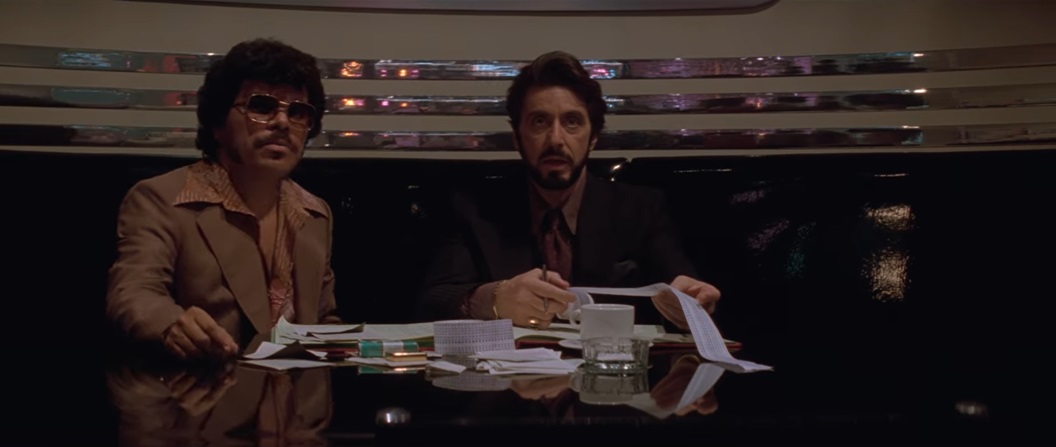
Here's more from Falk's article, in which Guzmán and producer Michael Bregman look back at Carlito's Way, 30 years later:
“To my recollection Al Pacino and Eddie Torres both worked out at the same gym,” explains Michael Bregman, who produced the film alongside his father Martin. “He told Al he had a book, Al read it and I guess Al ran off and tried to make it a bunch of times, but it didn’t work out. And then he gave it to my dad who gave it to me.”The cast was rounded out by Penelope Ann Miller, John Leguizamo (who had to be convinced to do it, even though Benicio Del Toro was super-keen), Viggo Mortensen and Guzman as Carlito’s bodyguard Pachanga, while Sean Penn shocked people thanks to his balding perm as crooked lawyer Dave Kleinfeld.
“Within four minutes of the last shot and the gate being checked, he had walked into the hair and make-up trailer and shaved his own head,” laughs Bregman of Penn. “The AD almost had a heart attack.”
Brian De Palma, who of course had previous with Pacino having directed him in Scarface, was a comparatively late addition to the fold, with Abel Ferrara (Bad Lieutenant) initially attached.
“Abel had just done King of New York,” remembers Bregman. “That movie is stupendous. He’d shown up to meet my dad and I because he’d wanted to do a film about [porn star] John Holmes starring Christopher Walken.”
“He seemed like the right fit [for Carlito’s Way], but the temperament was not going to work at Universal Pictures,” he continues. “Abel’s an outlier and he has a certain way of working. It was a terrible parting of the ways because we’d become friends in the midst of it and then he wasn’t doing the movie and he went bats*** crazy. Then a year or so later we were pals again.”
Guzman recalls being “directed but not really” by Brian De Palma. The director had laughed during his audition, with the star not knowing whether that was a good thing until he arrived back home afterwards to find a message on his answering machine telling him he had the part. On-set, early in his career and keen to impress, the actor would ask the helmer whether he was on the right track and was normally rewarded with little more than a grunt. “He was a man of very few words,” says Guzman.
But for the actor, who had grown up Latino on the Lower East Side of Manhattan, Carlito’s Way felt authentic to his blue-collar upbringing and former career as a social worker.
“Back in those days it was coke, alcohol, a lot of parties. A lot of girls,” he remembers. “We used to go clubbing and then you come back to the neighbourhood and there were these little social clubs. In the back of the social club there was always a pool table. That’s where s*** always started. That’s where I would find the people who exemplified the Pachangas of the world. Those guys were my reference.”
He continues, “The club scenes in Carlito, they were spot on. We had 300 of the best club dancers in New York City. In the holding area, it was like a party going on the whole time. People would bring their boom boxes. Instead of sitting around, it was fifty, sixty couples just dancing.”
Bregman recalls shooting in a pre-Guiliani New York that still reflected the grimier Big Apple of the 1970s when the film was set.
“We were lucky,” he says. “It still hadn’t metamorphosised and you could drop into the barrio and stuff structurally still existed. Subway stations in the outer boroughs still looked they did [20 years previously].”

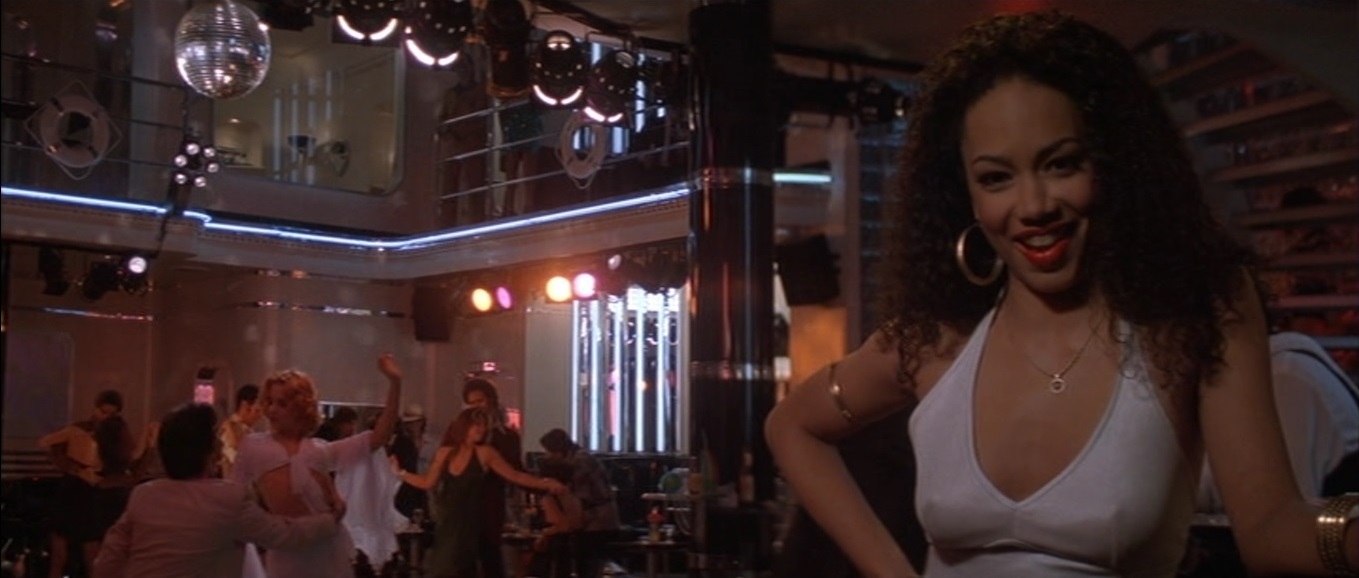
I just love Carlito’s Way, because it’s, for me – coming from the disco point of view – it’s actually one of the few films made after the era that could have well been made within it, if you see what I mean. There’s very few movies – and Saturday Night Fever is obviously, you know, the one that’s going to do it – and all the others that came along didn’t quite get it right, whereas Carlito’s Way got it exactly right. I do have a couple of issues with a few of the songs that are in there that are actually out of the time loop. But other than that, for me, if you’re a De Palma fan, if you’re a gangster fan, if you’re a disco fan, it is the perfect movie. And I also – I’m going to bore you to death with disco by the end of this, I’m sure – but I mean, I’ve just written my autobiography, which is called DISCOMANIA! And basically what it is, is my favorite disco movies of all time, of which Carlito’s Way is one. Why they’re important to me, what memories they spark, and the tracks in it that actually take me back to my era of the punk-disco seventies. So that’s where it’s all coming from.

In The Pocket Essential Brian De Palma (2000), John Ashbrook writes about Carlito's Way, "This is De Palma's first film noir. Essentially, the noir protagonist is a character with too much past and not enough future. Redemption is only achievable with death, because only with the full payment of all outstanding debts can the books be cleared. In essence, Carlito is dead before the film begins. As he tells Kleinfeld, 'I was dead and buried and you dug me up!' Consequently, he is now living on borrowed time. He has been given a chance to undo some of the evils of his life, but he fails. His time is wasted."
As Gail says while looking at Carlito in the mirror, "I know how this dream ends, Charlie..."










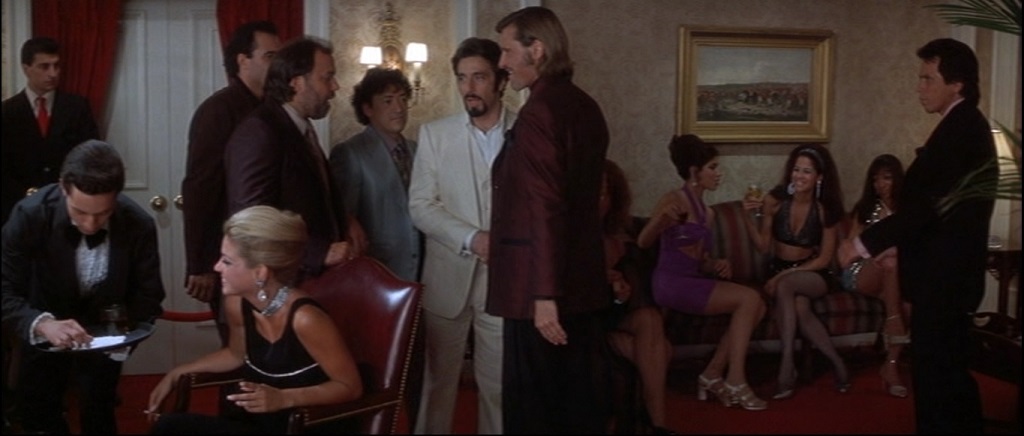


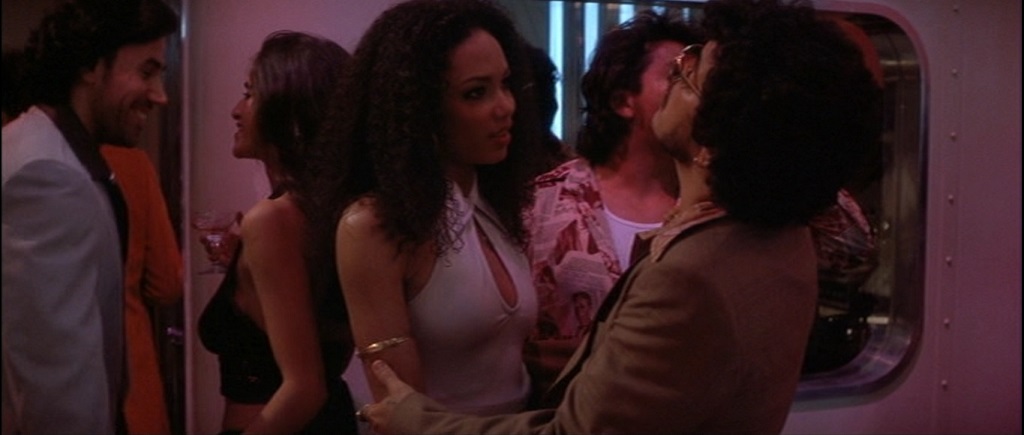
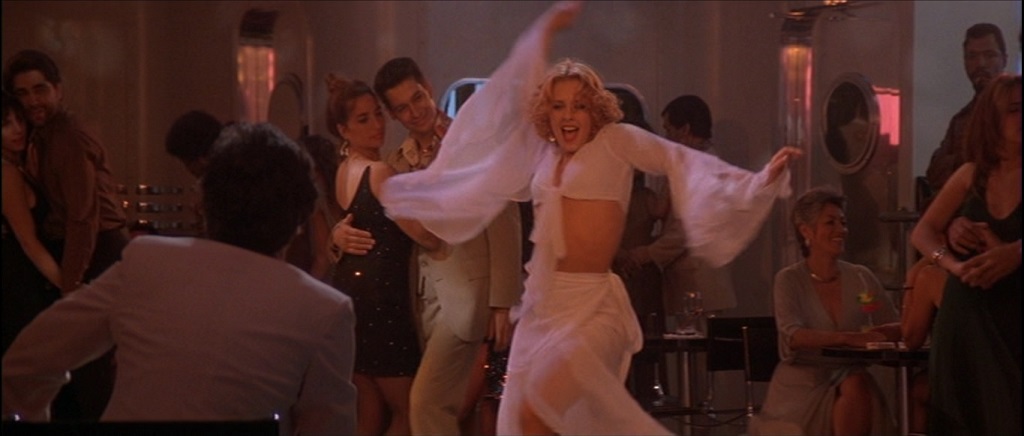
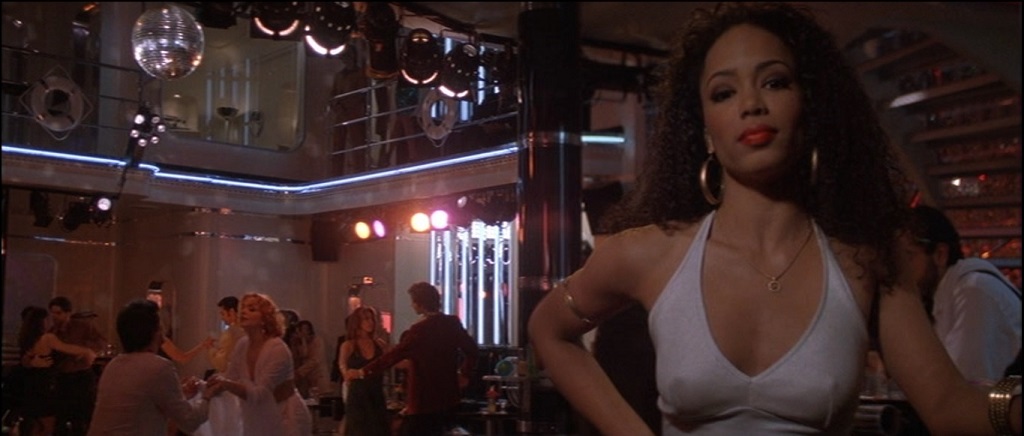
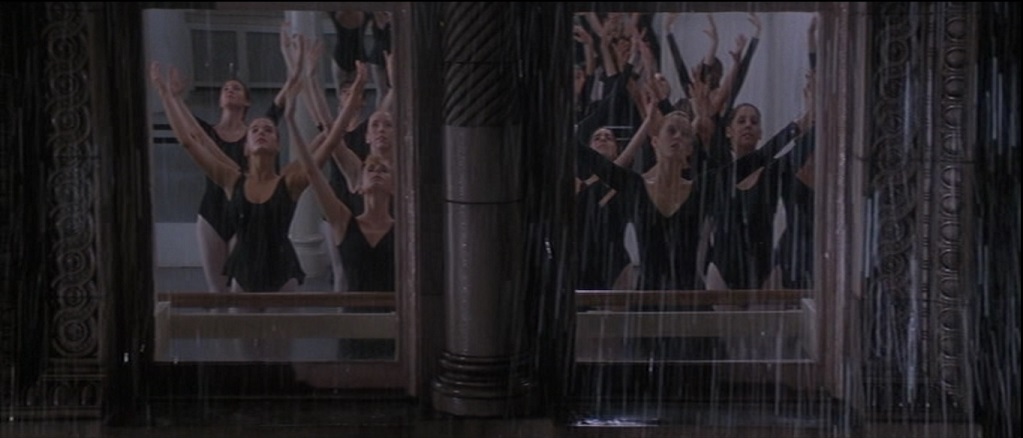
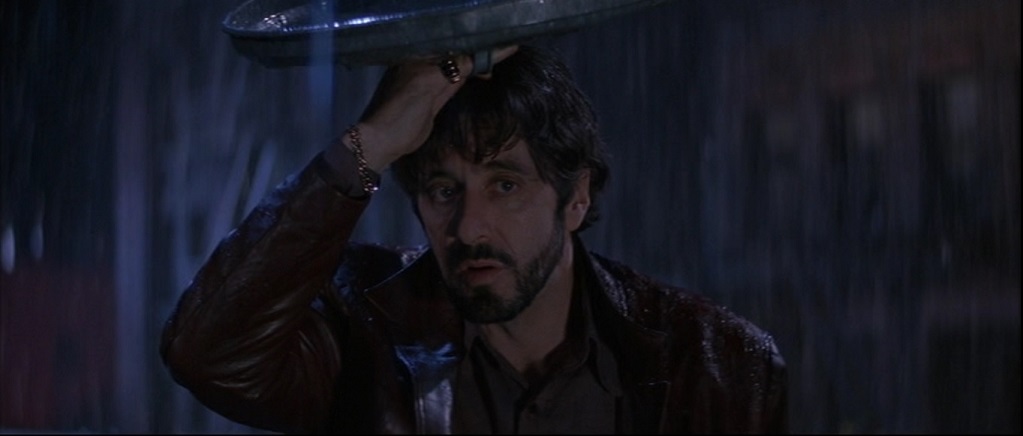
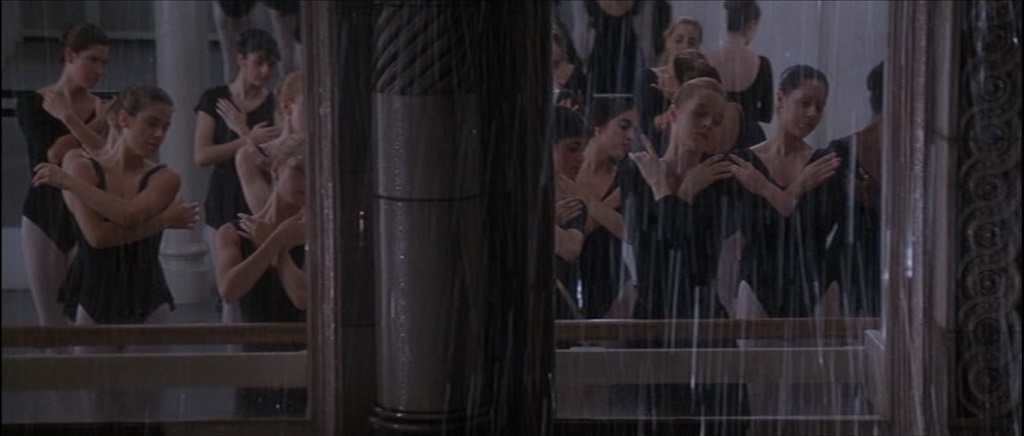
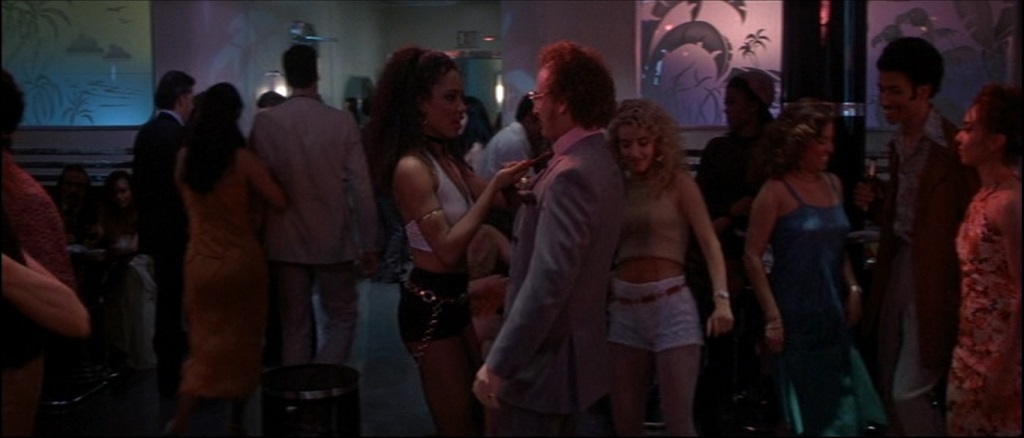
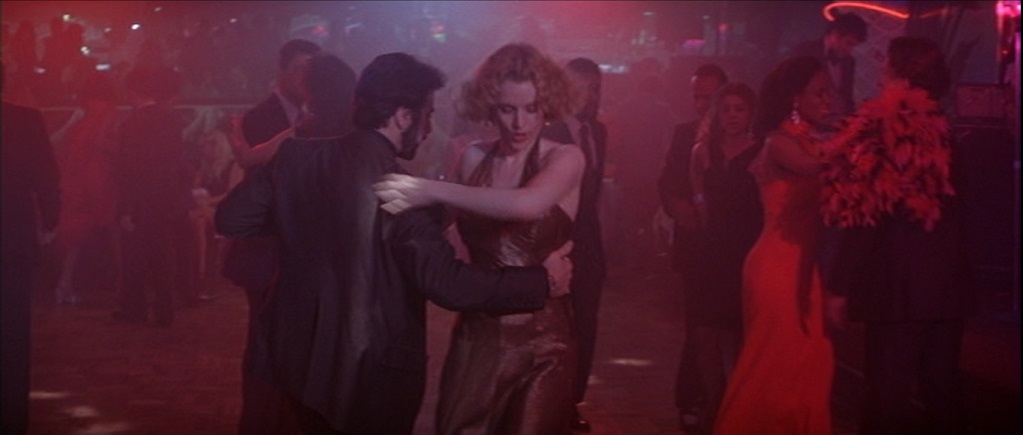


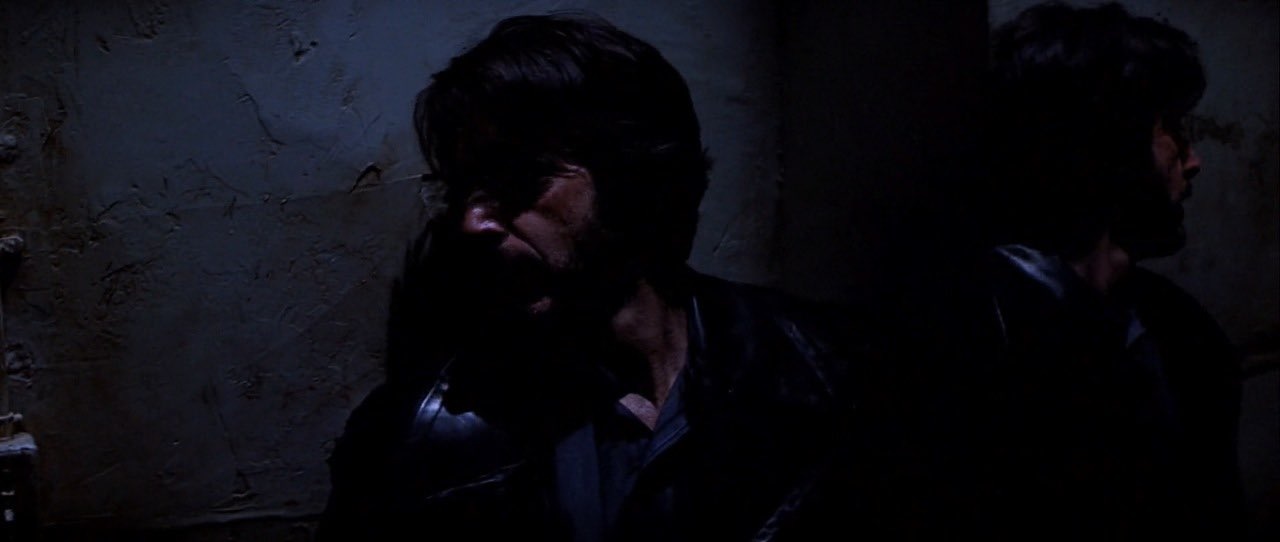
Well before it turned 30, Carlito’s Way was already an anniversary picture: A reunion between Pacino, De Palma, producer Martin Bregman and Universal Pictures, almost exactly a decade after they all worked together on Scarface. (The concept of Pacino doing a Latino accent was allowed to tag along too, apparently.) Scarface’s reputation grew in stature since its respectable, unremarkable box office performance in 1983, as it became a gangster classic, an iconic Pacino vehicle and the inspiration for a number of high-profile rappers. Carlito’s Way is also probably better-regarded now than it was at the time of its original release, but though it did inspire a later direct-to-DVD prequel indicating some youth-market interest, it hasn’t reached Scarface heights of imitation, homage or (despite that great silhouette) dorm-room poster ubiquity. But it’s the better film of the two – maybe even De Palma’s best overall. The director himself seems to think so: “I can’t make a better picture than this,” he recalls thinking to himself while rewatching the movie a few months after it debuted to middling business in the U.S. (See the wonderful documentary De Palma for a candid play-by-play of this and all of his other movies.)At the time, though, Carlito’s Way was oddly received as an awards-season also-ran, on the heels of Pacino’s recent Oscar win for Scent of a Woman, just about six months earlier. That career context provides – whether intentional or not – De Palma’s smaller-than-usual dose of meta-movie playfulness. Early in the film, Pacino’s Carlito gets a new lease on life when an evidence-tampering technicality springs him from a 30-year prison sentence after only five years. He then insists on addressing the courtroom, talking about how he’s been vindicated by the law, with a hamminess not too far removed from his climactic Scent of a Woman grandstanding. As if to point out the artifice of this performance, the visibly irritated judge tells him to cut it out: “You’re not accepting an award,” he says, though the last time much of the audience had seen Pacino, he was doing just that. Carlito is undeterred and continues his speech.
If that’s an in-joke, it’s an outlier. Apart from one other seeming wink at the audience, when another character informs Carlito that he could pass for Italian (some might say more readily than he could pass for Puerto Rican or Cuban!), the movie finds both Pacino and De Palma in a more reflective mood. Carlito really does want to use his second chance to go straight, earn enough money to buy into a car-rental business a friend runs in the Bahamas, and leave 1970s New York City behind. It turns out that his ticket out of prison is also his ticket back into the life he no longer wants: His lawyer Dave Kleinfeld (Sean Penn) gets him a job running a club, but then eventually Dave needs a big favor, and the movie’s final 45 minutes kick into gear with sweaty, inexorably mounting tension.
If the movie often avoids the operatic grandeur of Scarface — no “World Is Yours” blimp, no coke mountain, no opulent bubble bath – Carlito’s Way also feels less constrained by its own story. “Constrained” might seem like an odd descriptor for a movie as sprawling as Scarface, but once Tony Montana scraps his way to a place in the drug trade, the less overt desperation slackens the movie, which turns repetitive before its big memorable finale. (Michelle Pfeiffer’s Elvira, Tony’s wife, memorably complains about both his obsession with money and his default “fuck”-laden mode of expression, as if to anticipate complaints about the movie itself.) In the earlier film, De Palma doesn’t always seem especially fascinated by the ins and outs of criminal activity (certainly not with the hopped-up attention of his pal Martin Scorsese), maybe because there isn’t an explicit voyeur figure whose point of view he can readily identify with.
Carlito, on the other hand, is a quieter, more observant character, narrating his own story with a weariness Pacino would tease out further in future roles. Also: Isn’t a guy attempting to bluff his way out of a tight corner, as in that early shoot-out, actually more compelling than the guy who, waiting for attackers behind a door and hollering threats, actually does have a gigantic-ass loaded machine gun at his disposal? The beginning of that Carlito’s Way sequence, where Carlito notices that something is amiss when his young cousin drags him along on a money drop, generates its suspense from the way De Palma makes his camera an extension of Pacino’s subtle wariness. Similarly, an extended chase sequence late in the film that moves from a subway car to Grand Central Station, delays its carnage until the very end; much of it involves watching Pacino run, hide and think on his feet, in a series of long takes that don’t flinch away from the walls closing in on him.
Elsewhere in the film, there are moments where the star turns up his volume knob, going from Pacino to PACINO, but like that courtroom scene and that big trailer line, they tend to be instances of Carlito performing toward his (legitimate) tough-guy image. When they’re not – when he’s arguing with Gail (Penelope Ann Miller), the ex-girlfriend he looks up post-incarceration, or confronting Penn’s maddening Kleinfeld – the fireworks are chased with a sense of palpable despair. De Palma seems to key into that contrast between an ex-gangster’s street-level reputation and private doubts, and the setpiece scrapes Carlito gets into feel more dangerous as a result. De Palma can still direct the hell out of a juicy stalking scene – Kleinfeld has a miniature doozy after the mob realizes he’s ripped them off and killed a made guy – without relying on the addictive dream logic of his more id-like, movie-drunk thrillers.
If that occasionally leaves Carlito’s Way moving at a leisurely pace compared to the spring-loaded craziness of Body Double or Dressed to Kill, well, it’s still 20-something minutes shorter than Scarface, and a lot more soulful. Typically when De Palma returns to certain motifs, they crackle with knowing wit. (I recall, as I often do, the satisfied laughter of a crowd at New York Film Festival beholding Passion when someone brings up the idea of identical twins, as if to say: Finally!) Carlito’s Way has plenty of familiar bits: The questionable loyalty to an unstable friend who the hero “owes,” a one-last-job-then-I’m-out proposition, the doomed romanticism of the reformed criminal who can’t fully extricate himself from that life. Yet the movie feels genuinely poignant, even – or especially – when it feels like it’s echoing Scarface: The wall-sized images of paradise seen in the earlier film are shrunk down to a little subway ad that captures Carlito’s attention in his final moments. Though Carlito’s Way doesn’t need Scarface to work as a piece of top-notch entertainment, it does feel grander and more accomplished in that better-loved movie’s shadow. De Palma’s masterful flourishes are also, in the end, easing us out of the stylish fugue created by larger-than-life images of gangsters. Tony Montana goes out in a blaze of glory – he dies big time. Carlito Brigante only wants to slip away.

Carlito Brigante, portrayed with poignant charisma by Al Pacino, is a character coloured with constraints and contradictions - capturing the essence of a man at odds with his own identity. His journey is fraught with emotional tension, and it serves as an allegory for the human struggle against the shackles of one's own history.The film's central conflict revolves around Carlito's unwavering desire to escape his criminal ties, juxtaposed with the inescapable lure of the life he once led, inevitably leading to an inexorable showdown with his destiny.
Brian De Palma's signature tracking shots, exquisite cinematography, and meticulous attention to detail create a film that is both visually stunning and emotionally resonant. The seductive aura of 1970s New York City, with its gritty allure and corrupt underbelly, is vividly brought to life through De Palma's lens.
It preserves the essence of a bygone era with meticulous attention to period detail. The film's costume design, soundtrack, and setting pay homage to the turbulent 1970s. The result is an immersive experience that transports the viewer to a world where flamboyant fashion and a pulsating soundtrack merge seamlessly with the gritty narrative.
The supporting characters are equally well-crafted, offering a glimpse into the diverse and often treacherous world of organised crime. Sean Penn's performance as David Kleinfeld, a slimy and unpredictable lawyer, mirrors Carlito's descent while showcasing the destructiveness of hubris. Gail, portrayed by Penelope Ann Miller, serves as a symbol of hope and love, albeit tinged with tragedy.
The film's evocative soundtrack, composed by Patrick Doyle, complements the narrative and heightens the emotional impact of the story. The Spanish guitar melodies and Latin rhythms imbue the film with a distinct fervour, enhancing the authenticity of its setting and characters.
Carlito's Way explores themes of loyalty and betrayal. Carlito's unyielding loyalty to those close to him contrasts against the backdrop of a world marred by treachery and deceit highlighting the moral complexity of the criminal underworld. His misguided trust becomes a tragic catalyst, emphasising the treacherous nature of a pursuit for a second chance.
The interplay of these themes provides an intricate introspection of human relationships - displaying the fragility of trust and the inescapable consequences of deception.
It is a tale of seeking salvation in a world filled with moral ambiguity, where the choices made are fraught with consequences. Carlito's attempt to escape his past is an allegory for the human condition itself—a struggle against the heaviness of one's history.
The film is rife with symbolism, from the religious iconography woven throughout the narrative to the omnipresent visual motif of the escalator, symbolizing Carlito's constant struggle to ascend from his criminal past. Every element of the film has been carefully constructed to imbue the story with a deeper layer of meaning, making it a rich and thought-provoking experience.
One of the key elements that makes Carlito's quest for redemption so intriguing is its ambiguity. Carlito is acutely aware of the consequences of his past actions and sincerely wants to change, but his loyalty to his old associations keeps him tethered to a world he's trying to escape. This tension between his desire to do good and his inability to completely sever ties with his criminal past depicts a universal dilemma – whether true redemption is even possible?
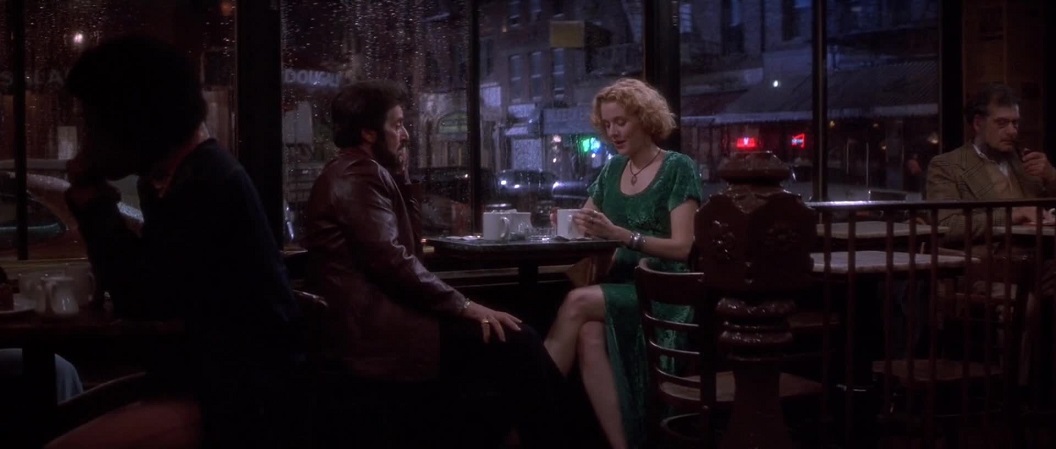
Here's some of what Bowen has to say about the film itself:
The opening credits sequence establishes a different De Palma register—a cohesion between the sentimental pull of pop cinema and the filmmaker’s sense of visual irony. In black and white, we see a man, whom we will soon know is Carlito Brigante (Al Pacino), collapse from a gunshot in a subway station. Carlito falls to the floor, his head tilting toward the ceiling, as his lover, Gail (Penelope Ann Miller), crouches beside him. Patrick Doyle’s operatic score swells, while the camera eases from Carlito’s point of view to float freely above and beyond him, suggesting a spirit on the verge of leaving its body. The prismatic compositions are ravishing and tragic.We’re not told at this point whether or not Carlito dies, though we have a good idea. But the gambit of killing the protagonist within seconds of the opening doesn’t serve the same purpose here as it did in, say, Sunset Boulevard. Billy Wilder used such a beginning to cast an amusing pall of futility on what followed. There’s futility in the opening of Carlito’s Way, but De Palma takes it deadly seriously. Carlito gazes at a billboard on one of the walls inside the subway station showing a picture of a beach and promising “paradise.” It mocks him as he slips away, succumbing to the pull of personal flaws that he’s failed to transcend. One may remember the Nancy Allen character’s death in Blow Out, brought on by a hero who didn’t know as much as he thought, who couldn’t be the person he wanted to be. Carlito dies for similar reasons.
The governing obsession of De Palma’s art is the limitations and failures of people who try to position themselves as heroes. In 1989, he cauterized this obsession with Casualties of War, bringing to a head the impotency that haunts his work. Perhaps that film, followed by two other maligned box office disasters—The Bonfire of the Vanities and the studio-mangled Raising Cain—softened De Palma up for something mellower in its melancholia—decidedly battered and middle-aged in temperament. Or perhaps he’s just a profoundly skilled artist for hire following the cues of a great screenplay. With a film this good, the distinction barely matters.
Carlito’s Way is a confident blend of several types of movies. It’s a crime melodrama, with most of the attendant clichés accounted for and transcended, especially of the last job before retirement from the underworld. It’s a star vehicle, with Pacino riding high at the crest of a resurgence that began with Harold Becker’s superb 1989 thriller Sea of Love and would continue through the 1990s and into the early aughts. It’s also a character study, filled to the brim with actors doing astonishing work—among them Sean Penn, Viggo Mortensen, John Leguizamo, and Luis Guzmán—with an unusual anecdotal structure. Vignettes interlock in surprising fashion, filling in the contours of Puerto Rican gangster Carlito’s life as he emerges from prison and is hit up by everyone for favors. And Carlito’s Way is also, like many a De Palma film before it, a hall of mirrors, with echoes of the filmmaker’s splashier, meaner, less involving Latino Pacino gangster epic, Scarface, and set pieces that explicitly reference The Untouchables, among others, as well as other Pacino films like The Godfather.
Yet Carlito’s Way has an ease and warmth and fluidity that disincline one to play the game of “spot the reference.” Most of De Palma’s films are floridly emotional, even heartbroken, especially those that he made in the 1970s and ’80s. But they’re also sardonic, as you sense someone fucking with you. With these vintage films, De Palma fans in particular are encouraged to get their pipe out and talk semiotics and wrap their brains around symbolism and motifs and overlook the maestro’s empathy for his characters, especially women.
On the other hand, Carlito’s Way, despite its volatility, allows the viewer to let their guard down. It’s glamorous, with Pacino at the zenith of his romantic magnetism, and De Palma knows how to let the audience soak in the soap-operatic bath. That’s why the film is so painful. It’s a dream about the death of dreams. And the filmmakers aren’t shy about articulating this idea either. Late in the film, Carlito lies in bed with Gail, an aspiring dancer and actress who moonlights as a stripper. They’re talking of ambitions. Carlito is going to leave the Harlem hood life behind and rent cars in the Bahamas, and he seems to believe it too. Of her dancing, Gail says, “Yeah, I had a dream once, but now I’m awake, and I hate my dream.”
That line always blindsides me. It’s even more shocking in its directness now, with modern pop cinema constantly pretending to empower us, telling us that we’re girlbosses and superheroes and that shame doesn’t exist despite evidence to the contrary. Gail cuts to the raw root of what haunts most people as they go through their lives, disappointed in themselves, coming not to recognize the mediocrities they feel themselves to be growing into. Her admission complements what are perhaps the most wrenchingly ironic words to be spoken in a De Palma film, when a young woman, a stranger unfamiliar with what has recently befallen him, tells Michael J. Fox’s character at the end of Casualties of War that a bad dream he references is “over now.”
Those words, well-intended, are poignantly inadequate to addressing the savagery that Fox’s character has had to witness and survive. Dreams can die but nightmares can flourish, an understanding brought about by the disillusionment that every De Palma hero experiences. Earlier, brasher De Palma films showed young characters learning this lesson, while Carlito’s Way exists in a defeated purgatorial realm from the outset. It’s a glossier, more approachable vision of the retrospection that courses through Casualties of War. Which isn’t say that the traditions of a gangster movie can be equated with a true-life story of rape and murder during the Vietnam War. But Carlito’s Way suggests that De Palma had returned to sublimating themes into genre in the wake of the general, grossly unjust rejection of Casualties of War. It’s one of those “for hire” works in which an artist finds an unexpected opportunity to get personal.
The maestro still can deliver his traditional goods as well, as there’s enough formal sizzle in Carlito’s Way for five De Palma films. It’s rich in snaking tracking shots that place us in Carlito’s fevered psyche, and in set pieces of a sensual, escalating intensity, particularly the chase inside Grand Central Terminal, with its slashing through lines and winding camera pirouettes. But the quieter effects are more haunting in Carlito’s Way, such as the blasts of expressionist blue hues that engulf Carlito as he spies on Gail’s dance class in the rain from a roof across the street in a sequence that suggests Rear Window reconfigured as a love sonata. Carlito’s Way is firstly a character film as noir opera. De Palma turns the petty disappointments of our lives into a grand myth, rich in the poetry that makes such disappointments bearable.
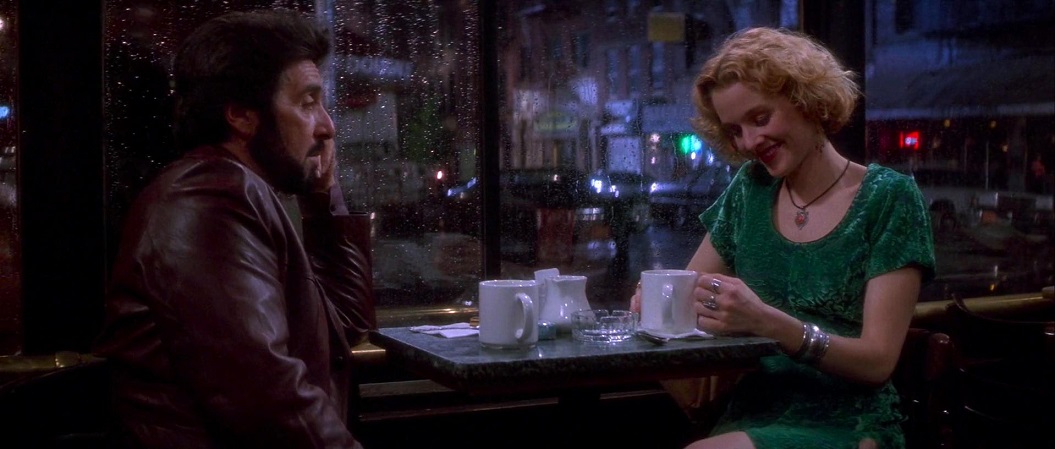

There are a million stories about criminals sprung from jail who vow to go straight. And then there’s Brian De Palma’s Carlito’s Way. Al Pacino—swaggering, streetwise, lovesick—gives one of his strongest, most fine-grained performances as convicted drug felon Carlito Brigante, whose crooked lawyer (played, fabulously, by Sean Penn in a perfect approximation of a ’70s man perm) somehow gets him freed after just five years of a 30-year sentence. Carlito’s post-prison dream is to buy into a car-rental joint in the Bahamas—all the better if he can persuade the love of his life, Gail (Penelope Ann Miller), to join him, though he broke her heart before going up the river. Few movies give you pretty much everything—exhilarating action and diamond-hard violence, doomed romance, bitterly funny dialogue—in such a compact package. But there’s something else: movie craftsmanship can be deeply pleasurable, but not by itself. In adapting a duo of novels by Edwin Torres (the script is by master screenwriter David Koepp), de Palma works in a style both economical and luxurious. There’s not a single superfluous shot; you’re entreated not just to look, but to see. The visual logic of a sequence involving a poolroom shootout is so gorgeously precise, it’s like a calculus equation written as a sonnet. Carlito’s Way is De Palma’s warmest film, so meticulous, so lyrical, so operatic in scope and pitch that it leaves you feeling both wrecked and deeply satisfied. It’s perfection that breathes.
Newer | Latest | Older